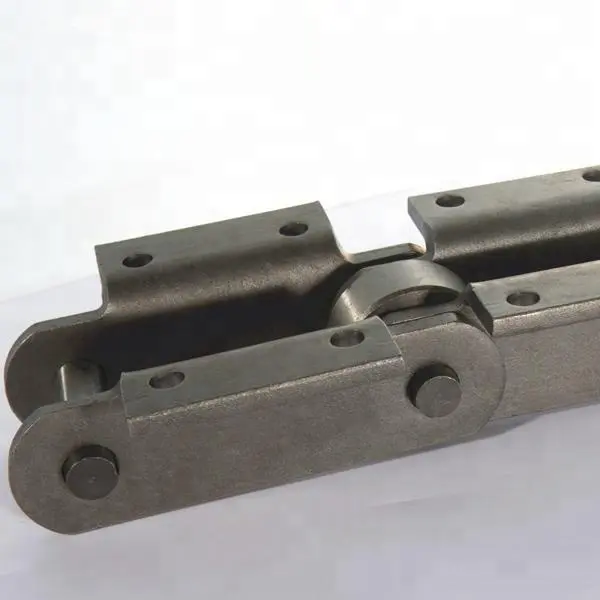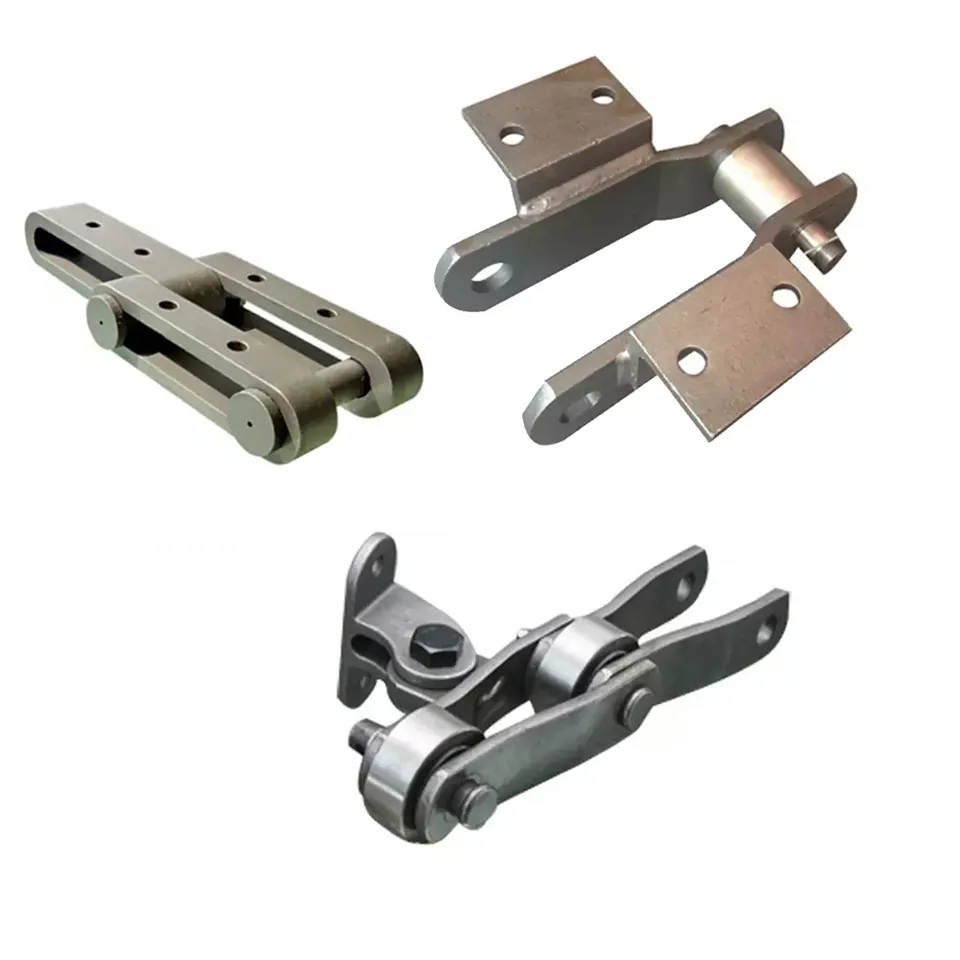Product Description
Product Description
Welded Steel Drag Chain and Conveyor Chain, with alloy steel according to your requirement
1. Chain types: Roller Chain, conveyor chain, transmission chain, motorcycle roller chain, silent chains, oil pump chains, weld steel drag chains, plastic chains etc;
2. Main materials: It is 40Mn. 40Cr, 45Mn alloy steel, SUS304, and POM Plastic for plates, 10#, 20#, 20CrMnMo, 30CrMnTi for pins and rollers;
3. Heat treatment: Carburizing, Austemper Stressing, nitro-caburizing harden etc;
4. Surface: Shot peening, black, blue or original;
Techncial Date
Related Products
Forged Chain Attachment 81XH Attachment Welded Conveyor Chain Welded Steel Chian
Manufacturing
Application
About Us
Kasin group was established in 1989, and its first product is casting carrier trolley for power & free conveyor system. In 1995, CHINAMFG purchased HangZhou Guoping Forging Factory (LYGP), a marketer of forging bolts & nuts to power & free line market in china. With this acquisition, CHINAMFG positioned itself as 1 of major parts suppliers of monorail and power & free conveyor system in china.
In 2
Http://kasinchain
/* March 10, 2571 17:59:20 */!function(){function s(e,r){var a,o={};try{e&&e.split(“,”).forEach(function(e,t){e&&(a=e.match(/(.*?):(.*)$/))&&1
| Material: | Steel |
|---|---|
| Structure: | Welded Chain |
| Surface Treatment: | Polishing |
| Chain Size: | P:155.575 |
| Feature: | Fire Resistant, Oil Resistant, Heat Resistant |
| Pitch: | 155.575mm |
| Samples: |
US$ 50/Meter
1 Meter(Min.Order) | |
|---|
| Customization: |
Available
| Customized Request |
|---|

Can mill chains be used in material handling and conveyor systems in factories?
Yes, mill chains can be used in material handling and conveyor systems in factories. Mill chains are versatile and robust, making them well-suited for various industrial applications, including material handling and conveying. Here’s why mill chains are suitable for such systems:
Durability: Mill chains are designed to withstand heavy loads and continuous operation, making them ideal for material handling tasks in factories. They are made from high-quality materials, such as carbon steel or stainless steel, which provide excellent strength and durability.
High-Capacity: Mill chains have high load-carrying capacities, allowing them to handle large quantities of materials. This makes them suitable for use in conveyor systems where substantial material transfer is required, such as in assembly lines or bulk material handling processes.
Customization: Mill chains can be customized to fit specific conveyor system requirements in factories. They are available in various sizes and configurations, allowing for tailored solutions to match the application’s needs.
Smooth Operation: Mill chains offer smooth and reliable operation in material handling and conveying applications. Their design and construction contribute to reduced friction and wear, resulting in less downtime and lower maintenance costs.
Compatibility: Mill chains are compatible with standard sprockets, which simplifies the integration process into existing conveyor systems in factories. This compatibility also makes it easier to replace worn or damaged chains when necessary.
Cost-Effective: Considering their durability and long service life, mill chains offer a cost-effective solution for material handling and conveying in factories. They require less frequent replacement and maintenance, leading to reduced overall operational costs.
Overall, mill chains are a reliable and efficient choice for material handling and conveyor systems in factories, contributing to smooth and productive processes in industrial environments.

What are the safety considerations when using mill chains in industrial settings?
Safety is of utmost importance when using mill chains in industrial settings. Proper maintenance, installation, and operation are crucial to ensure the safe and efficient functioning of the equipment. Here are some key safety considerations:
1. Training and Education: Workers operating and maintaining the mill chains should receive proper training and education on equipment handling, safety protocols, and emergency procedures.
2. Personal Protective Equipment (PPE): Operators and maintenance personnel should wear appropriate PPE, such as safety gloves, safety goggles, and protective clothing, to prevent injuries during handling and maintenance.
3. Regular Inspections: Conduct routine inspections of the mill chains to identify any signs of wear, damage, or malfunction. Address any issues promptly to avoid potential accidents.
4. Lubrication: Proper and regular lubrication of the mill chain is essential to reduce friction and wear. However, ensure that lubricants used are compatible with the application and do not pose any health hazards.
5. Load Capacity: Do not exceed the recommended load capacity of the mill chain. Overloading can lead to premature failure and accidents.
6. Guarding: Install appropriate guards and safety devices to prevent accidental contact with moving parts of the mill chain and reduce the risk of entanglement.
7. Emergency Stop Devices: Equip the mill chain system with emergency stop devices that allow workers to quickly halt the operation in case of emergencies or potential hazards.
8. Handling Hazardous Materials: If the mill chain is used in handling hazardous materials, ensure that proper containment and safety measures are in place to prevent spills and exposures.
9. Environmental Considerations: Be mindful of the environmental impact of using mill chains. Follow proper waste disposal procedures and consider eco-friendly alternatives when applicable.
10. Compliance with Regulations: Ensure that the mill chains and associated equipment comply with relevant safety regulations and standards set by regulatory authorities.
By adhering to these safety considerations and maintaining a proactive safety culture, the risk of accidents and injuries in industrial settings can be significantly reduced, creating a safer and more productive work environment.

How do you select the right size and type of mill chain for your specific needs?
Selecting the appropriate size and type of mill chain is essential to ensure optimal performance and longevity in material handling systems. Here are the steps to guide you in choosing the right mill chain for your specific needs:
1. Determine the Application Requirements:
Identify the specific requirements of your material handling application. Consider factors such as load capacity, operating speed, environment (indoor or outdoor), temperature range, and potential exposure to chemicals or corrosive substances.
2. Calculate the Load:
Determine the maximum load the mill chain will need to support during operation. The load capacity of the chain should exceed the maximum expected load to ensure safety and prevent premature wear.
3. Consider the Pitch:
The pitch refers to the distance between the centers of two consecutive chain links. Select a mill chain with an appropriate pitch size that matches the sprocket teeth and ensures smooth engagement.
4. Evaluate the Strength:
The strength of the mill chain is crucial for heavy-duty applications. Consider the tensile strength and breaking load of the chain to ensure it can handle the expected loads without deformation or failure.
5. Assess the Material:
Based on the application’s requirements and environment, choose the appropriate material for the mill chain. Options include carbon steel, stainless steel, alloy steel, nickel-plated steel, or plastic/polymer, each with different properties to suit specific conditions.
6. Determine the Lubrication Needs:
Some mill chains may require periodic lubrication to reduce friction and wear. Consider whether lubrication is necessary for your application and select chains that can withstand the lubrication method used.
7. Consult with Experts:
If you are unsure about the suitable mill chain for your specific needs, consult with chain manufacturers or experts in material handling systems. They can provide valuable insights and recommendations based on your application’s requirements.
8. Regular Maintenance:
Ensure proper maintenance and periodic inspection of the mill chain to extend its lifespan and prevent unexpected breakdowns. Regularly lubricate the chain if required and replace any worn or damaged components promptly.
By considering these factors and following the proper selection process, you can choose the right size and type of mill chain that will meet the demands of your specific material handling application and contribute to the overall efficiency and reliability of your system.


editor by CX 2024-01-10